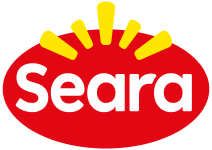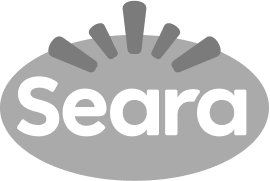Contact Us
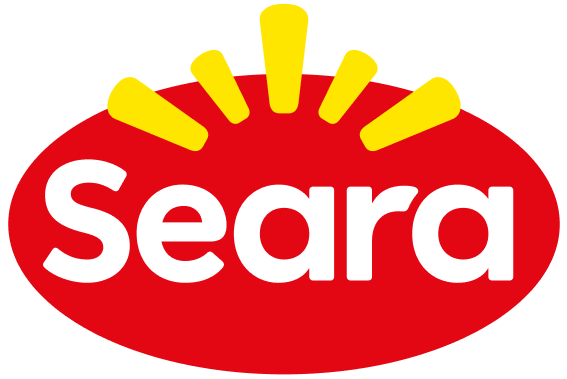
Introducing Seara,
a leading Brazilian meat producer
with a history of over 65 years.
-

65 Years
Feeding the world
& people -

~5.1M
Slaughtered
birds per day -

~26.7K
Slaughtered
hogs per day -

>130개
Number of exporting
countries worldwide
Seara is one of the major brands of JBS Group,
the global No. 1 protein producer.
For over 60 years, Seara has been feeding the world and people with the best there is. We take excellence and innovation, every day, to more than 130 countries through our products and services, in several channels such as retail, food servicing, processing factories and distribution.
Being one of the major brands of JBS Group, the world’s largest animal protein producer (beef, lamb, pork, poultry) and also a major player of plant-based protein, Seara has an extensive portfolio of fresh poultry and pork products and prepared foods. From the origin to the consumer’s table, Seara is committed to quality and food safety.
Corporate Profile
- Headquarters
- Seara Alimentos LTDA
- Year of Foundation
- 1956
- Headquarters’ Address
- Av. Marginal Direita do Tiete, 500, Vila Jaguara - Sao Paulo - SP - Brazil
- President
- Joao Campos
- Business
- Manufacturing and selling of chicken, pork, processed food, and plant-basedd meat
- Number of Employees
- 92,000
- Commercial Office in Japan
- Seara Japan LLC
- Year of Foundation
- 2015
- Address
- Akasaka Nakanishi Building 6F, 4-1-33 Akasaka, Minato, Tokyo, Japan 107-0052
- Director
- Tiago Marson Fonseca
Check out the certification mark that guarantees the best quality!
Under these global quality assurance systems, we produce safe and
secure food products for customers all over the world.
Seara factories regularly undergoes internal and external quality audits, such as by the Federal Inspection Service (SIF) of the Brazilian Ministry of Agriculture and third-party auditing bodies. In addition, we have obtained the following international certifications, issued by the world’s highest level certification bodies in the food industry*.
- BRC (British Retailers Association)
- SWA (Supplier Workplace Environment Management Program)
- Global GAP (Global Agricultural Production Process Management)
- ISO 17025 (Quality Management)
- ISO 14001 (Environmental Management)
- SMETA (Social Audit)
- ALO FREE (Swiss Law)
- Halal, and so on.
*The certifications may differ in each factory.
Fresh
chicken and pork are
made daily in Brazil.
-

~92,000
Team members -

30 Poultry Processing Facilities
~5.1 million birds per day -

8 Hog Processing Facilities
~26.7 thousand hogs per day -

24 Prepared Foods Facilities
~142.4 thousand tons per month -

18 Distribution Centers
-

11 Overseas Sales Offices
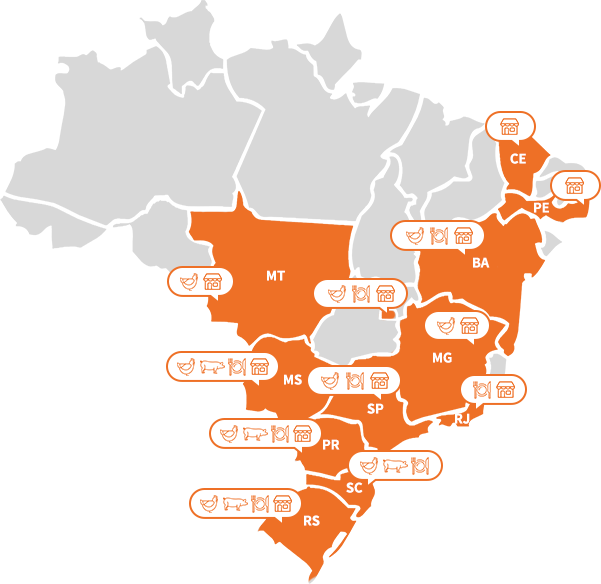
Our History
For more than 65 years, Seara has been working to offer products that take convenience,
trust and innovation to the consumers.
-
1956
The first large slaughter house in the city of Seara in Santa Catarina.
-
1968
Uirapuru, the first farm of study and research of porks, to further improve the quality of meat.
-
1975
240 tons of chicken for Kuwait, our first international transaction.
-
1976
In Xanxere, our first incubation center is launched.
-
1980
Ceval buys Seara, increasing the brand and expanding the investment capacity.
-
1982
We are the first Brazilian meat company to export chicken cuts to Europe. First export of raw chicken to Japan.
-
1983
We acquired the stock control of the slaughter house Rio da Luz S. A, in Jaraguá do Sul.
-
1989
Ceval incorporates Seara Industrial, and we become a Ceval brand together with the plants of Jacarézinho and Nuporanga.
-
1990
Acquisition of Dourados-MS plant.
-
1995
Acquisition of Sidrolândia-MS, and of Forquilhinha-SC plants.
-
1996
We are the first Brazilian company to receive ISO quality certification: 9002, for the whole chicken chain.
-
1997
Ceval was bought by the Bunge group.
-
1998
Creation of Seara Alimentos S.A. We became an independent company controlled by Mutual Inv. Ltda.
-
1999
Offices in Buenos Aires, Amsterdam, Singapore, Tokyo, and Dubai. We control the port facility in Braskarne.
-
2000
We are the largest pork exporter in Brazil.
-
2001
We established the thermoprocessed chicken factory in Itapiranga – SC.
-
2003
Our company is present in 27 new countries.
-
2005
Seara food products is controlled by a large international group in the food sector.
-
2006
First export of heat-treated pork products to Japan.
-
2007
First export of heat processed chicken products to Japan.
-
2013
Seara food products is now controlled by the JBS group, the world leader in meat processing. Seara exported its first raw pork container to Japan.
-
2016
Our new visual identity was launched in a more modern and suitable way in the current market.
-
2021
First export of plant-based meat to Japan.
JBS Culture
Our Mission
To be the best in all that we do, completely focused on our business, ensuring the best products and services to our customers, a relationship of trust with our suppliers, profitability for our shareholders and the opportunity of a better future for all our team members.
Our Values
Our Values guide our efforts toward achieving Our Mission of being the best in all that we do.
-
Determination
Be relentless. Deliver superior results.
Adopt a sense of urgency. Make things happen. -
Simplicity
Be practical. Focus on what’s important.
adopt a hands-on approach. Avoid bureaucracy. -
Availability
Be receptive and open. Always be prepared and
motivated to take on new challenges. -
Humility
Listen. Be helpful and thoughtful. Act with respect.
Prioritize the team over yourself.
Value the opinion of others. -
Sincerity
Be direct, truthful and transparent. Respectfully express opinion. Know how to say no but be positive and offer
solutions. -
Discipline
Be punctual. Fulfill commitments.
Deliver results. Do not make excuses. -
Ownership
Be committed to results.
Focus on details. Take responsibility.
Compliance
JBS has a robust compliance program and is committed to conducting its business ethically, with integrity, in accordance with all applicable laws, regulations and rules.
JBS expects its Business Associates to demonstrate the same commitment by following the highest standards of business conduct, integrity and complying with all applicable laws, regulations and rules. All Business Associates agree to abide by the Business Associate Code of Conduct (the "BACC").
Get to know our Code of Conduct and Ethics and Business Associate Code of Conduct.
-

Sustainability
Sustainability is the foundation
Learn More
of our business strategy, so that
our actions can generate
positive impacts for team
members, suppliers, customers,
society and the planet. -

Eco-Friendly
From the beginning of the production
to the product delivery, we strictly
control the process to guarantee
it is entirely eco-friendly. -

NET ZERO 2040
JBS announced our global
Learn More
public commitment to being
Net Zero by 2040.
Animal Welfare
& Breeding
We respect and protect
the fundamental freedoms
of animals throughout the
production process to keep
our ethical commitment to
animal welfare.
The commitment to ensuring animal welfare is among the priorities of JBS’ global agenda, respecting the demands of customers, consumers and society, and also the precepts of valuing life. The Company’s operations are benchmarked to best practices and, are in line with the five fundamental freedoms of animals, as defined by the Farm Animal Welfare Council (FAWC). The Company creates partnerships with producers around the world to ensure they abide by this agenda, while also maintaining specialized species-specific teams that adopt constantly revised techniques and encourage producers to provide the animals with the best treatment possible.
Five fundamental animal freedoms
- 1. Freedom from hunger and thirst
- 2. Freedom from discomfort
- 3. Freedom from pain, injury or disease
- 4. Freedom to express normal behavior
- 5. Freedom from fear and distress
At all processing units, multidisciplinary teams are responsible for ensuring compliance with the policies and procedures required by animal welfare programs. Any violations of the Company’s Animal Welfare Program (Programa de Bem-Estar Animal) by team members or suppliers may result in disciplinary processes that could lead to termination of employment or contracts with suppliers.
All operations comply with local laws and technical standards, as well as the principles of animal freedom and humane slaughter. For commercial reasons, the company adopts religious guidelines that respect the cultural characteristics and diversity of the markets in which it operates.
Our Pig Farm
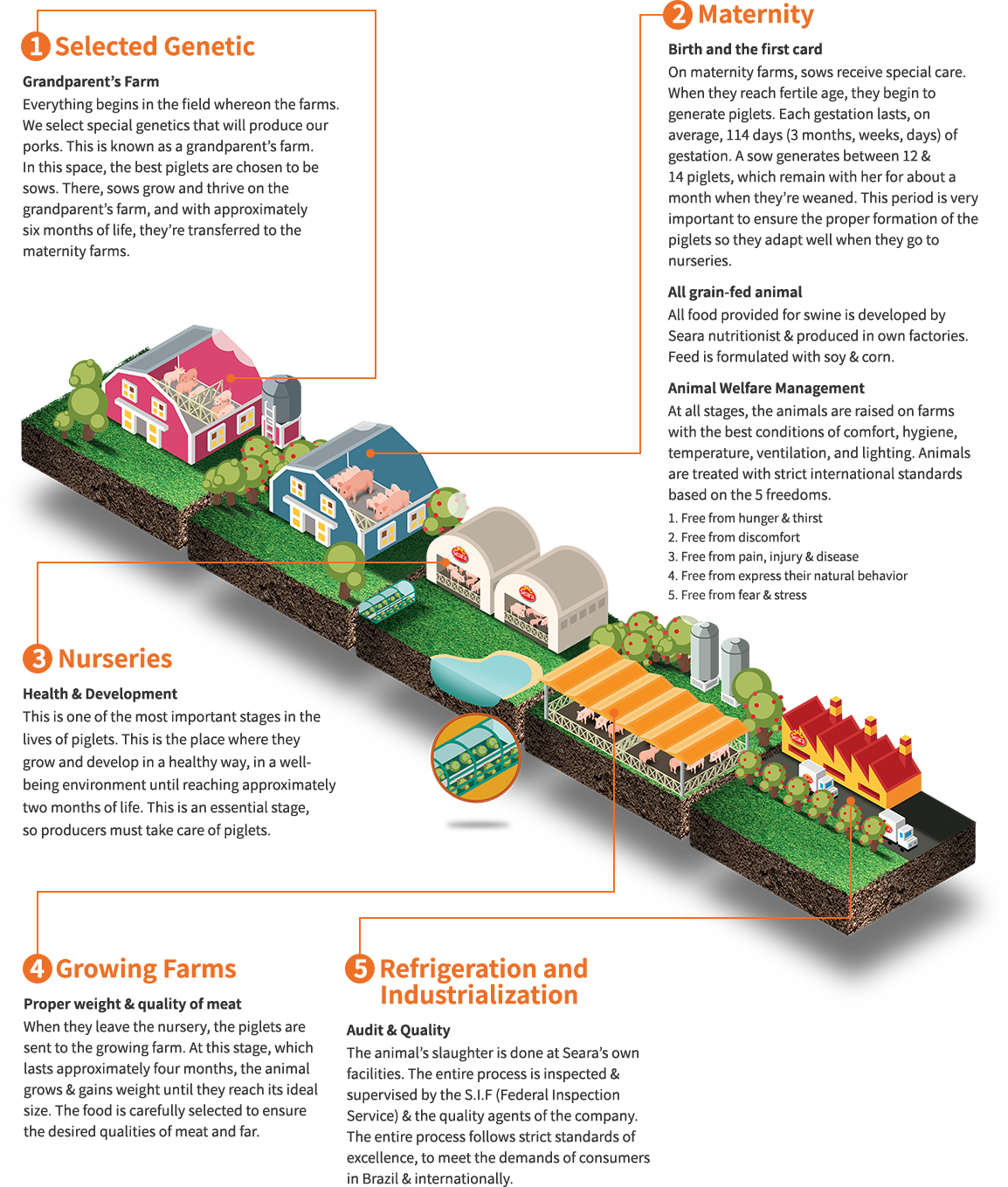
Promotional Video about Seara Pork
About Our Pork Quality and Production System
Our Chicken Farms
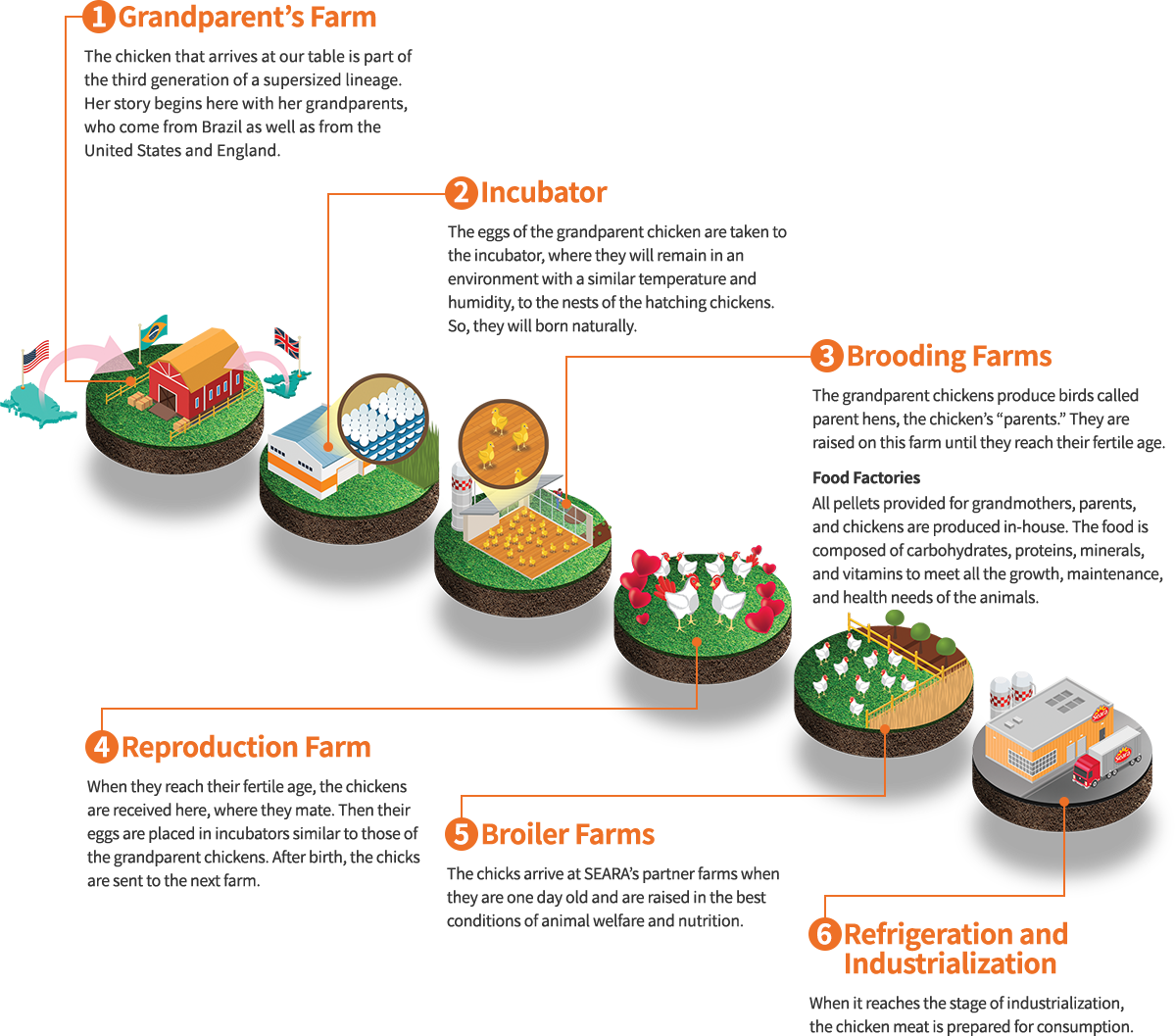
We practice transparent management
Check out Seara's results and institutional presentations.
Sustainability
Sustainability is the foundation of our business strategy, so that our actions can generate positive impacts for team members, suppliers, customers, society and the planet. We are fully committed to quality in our products, from the farm to the fork.
In 2021, we made our most significant environmental commitment: to become Net Zero by 2040. We are going to achieve net zero greenhouse gas emissions by reducing direct and indirect emissions, while offsetting residual emissions.
We have pushed ahead with renewable energy in all our operations. Solar energy is arriving at our facilities, as well as electric trucks.
JBS also has a high-profile position in the circular economy, like the production of biodiesel and organic fertilizer from the waste produced by our production processes. Around 50% of the total waste generated by our global operations was recycled in 2020. The group company has zero tolerance with deforestation. For more than 10 years we have been monitoring 100% of our suppliers.
And, in 2020, we took a major step to ensure a supply chain free from illegal deforestation at the using blockchain technology.
Transparent Livestock Farming Platform will also enable us to extend socioenvironmental monitoring to all our suppliers and suppliers of our suppliers.
NET ZERO 2040
In 2021, JBS announced our global public commitment for being Net Zero by 2040.
To accomplish its net-zero goal, the company will adopt several strategies to achieve reductions in emissions, including.
-
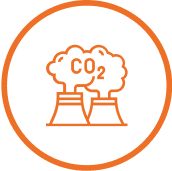
Reducing direct emissions in its facilities: JBS will reduce its global scope 1 and 2 emission intensity by at least 30% by 2030 against base year 2019.
-
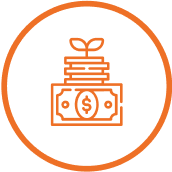
Investing in the future: JBS will invest more than $1 billion in incremental capital expenditures over the next decade in emission reduction projects. The company will engage its team members and award funding for projects to its facilities using a panel consisting of company executives, specialists and academics.
-
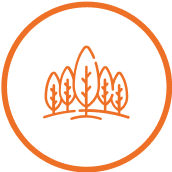
Eliminating deforestation: JBS will eliminate illegal Amazon deforestation from its supply chain – including the suppliers of it suppliers by 2025, and in other Brazilian biomes by 2030. The company will achieve zero deforestation across its global supply chain by 2035.
-
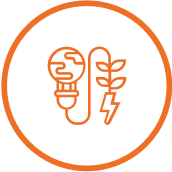
Using 100% renewable electricity in its facilities: JBS will join RE100 and convert to 100% renewable electricity across its global facilities by 2040.
-
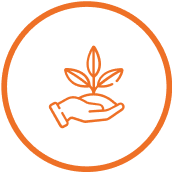
Fostering innovation: JBS will invest $100 million by 2030 in research and development projects to assist producer efforts to strengthen and scale regenerative farming practices, including carbon sequestration and on farm emission mitigation technologies. This investment will contribute to reducing scope 3 emissions across the value chain, in our efforts toward net zero.
-

Compensation tied to environmental goals: JBS has established the Fund for the AMAZON, a non-profit civil society organization dedicated to promoting and funding projects aimed at sustainable development of the Amazon tropical forest.
